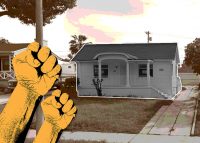Redeveloping a nearly 50-acre swath known as the 710 stub in Pasadena would take a decade, city officials say.
That was the conclusion made in early planning efforts to reintegrate the once-planned extension to the 710 Freeway back into the community, the Pasadena Star-News reported.
“We’re embarking on a process that will involve an outreach process that’s anticipated to span three years in order to develop the city’s vision for the area, and several more before any development would occur,” City Manager Miguel Marquez said during a City Council meeting.
The city needs to study the cost and feasibility of filling the once-proposed freeway, which was built on land that was seized through eminent domain six decades ago.
The state seizure of the land broke up minority and low-income neighborhoods, created dozens of vacant homes and sparked decades of opposition over the extension’s potential to further impact home values and surrounding neighborhoods.
Cities across the San Gabriel Valley had struggled to remove the 710 Freeway’s northerly extension project from the state’s highways plan for years. The extension was to have included a tunnel to connect the 710 and the 210 freeways.
But in June, in what was deemed a win for local control in Pasadena, the California Transportation Commission decided to return the nearly 50-acre corridor at the 710’s northern terminus back to the City of Pasadena, along with a payment of $5 million.
The 710 freeway’s conclusion at Valley Boulevard now forces traffic onto local streets, where some drivers travel 4.5 miles to the 210 Freeway entrance, a dusty ditch of gravel and dirt.
The city must now decide what to do with its new corridor of at least 40 acres, whether the city wants to fill the ditch and build on top of it.
Councilman Tyron Hampton, whose aunt was one of many Black residents in Pasadena who lost a home during the land seizure, said he believes the city has an obligation to restore — not recreate a community.
“It was a single-family neighborhood. It had businesses there,” Hampton said. “We don’t always have the opportunity to to make things right, and this is that opportunity.”
— Dana Bartholomew
Read more


